Role of Leader and Manager in Operations Management at Tesco
VerifiedAdded on 2023/01/11
|15
|4413
|46
AI Summary
This article discusses the different roles and characteristics of a leader and manager in operations management at Tesco. It explores the functions of a manager, such as planning, organizing, directing, and staffing, and the importance of leadership in achieving business objectives. The article also evaluates different theories and models of approach, including situational leadership, contingency theory, and system leadership. Additionally, it highlights the importance of operations management in the company and the approaches used, such as lean production and six sigma.
Contribute Materials
Your contribution can guide someone’s learning journey. Share your
documents today.
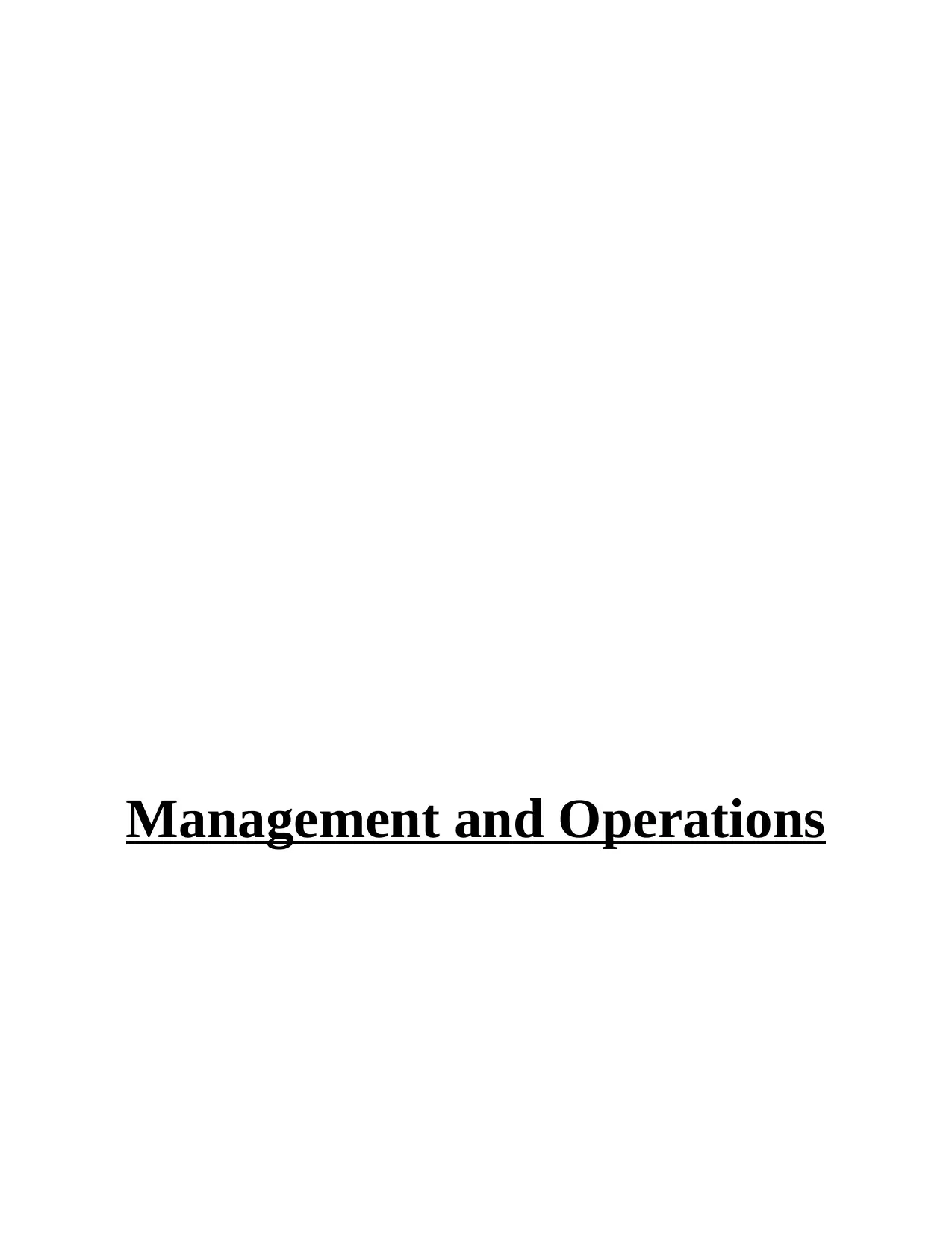
Management and Operations
Secure Best Marks with AI Grader
Need help grading? Try our AI Grader for instant feedback on your assignments.
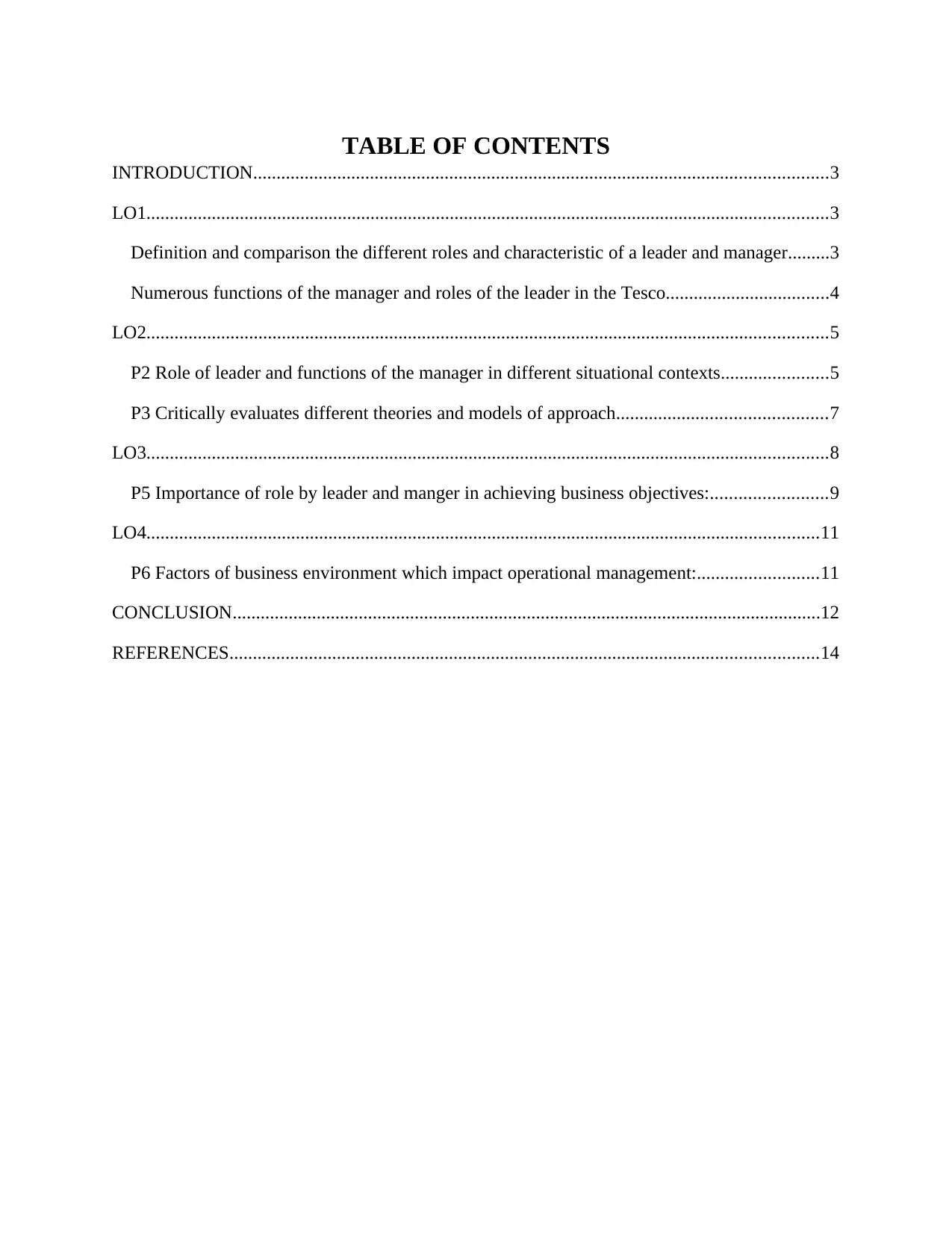
TABLE OF CONTENTS
INTRODUCTION...........................................................................................................................3
LO1..................................................................................................................................................3
Definition and comparison the different roles and characteristic of a leader and manager.........3
Numerous functions of the manager and roles of the leader in the Tesco...................................4
LO2..................................................................................................................................................5
P2 Role of leader and functions of the manager in different situational contexts.......................5
P3 Critically evaluates different theories and models of approach.............................................7
LO3..................................................................................................................................................8
P5 Importance of role by leader and manger in achieving business objectives:.........................9
LO4................................................................................................................................................11
P6 Factors of business environment which impact operational management:..........................11
CONCLUSION..............................................................................................................................12
REFERENCES..............................................................................................................................14
INTRODUCTION...........................................................................................................................3
LO1..................................................................................................................................................3
Definition and comparison the different roles and characteristic of a leader and manager.........3
Numerous functions of the manager and roles of the leader in the Tesco...................................4
LO2..................................................................................................................................................5
P2 Role of leader and functions of the manager in different situational contexts.......................5
P3 Critically evaluates different theories and models of approach.............................................7
LO3..................................................................................................................................................8
P5 Importance of role by leader and manger in achieving business objectives:.........................9
LO4................................................................................................................................................11
P6 Factors of business environment which impact operational management:..........................11
CONCLUSION..............................................................................................................................12
REFERENCES..............................................................................................................................14
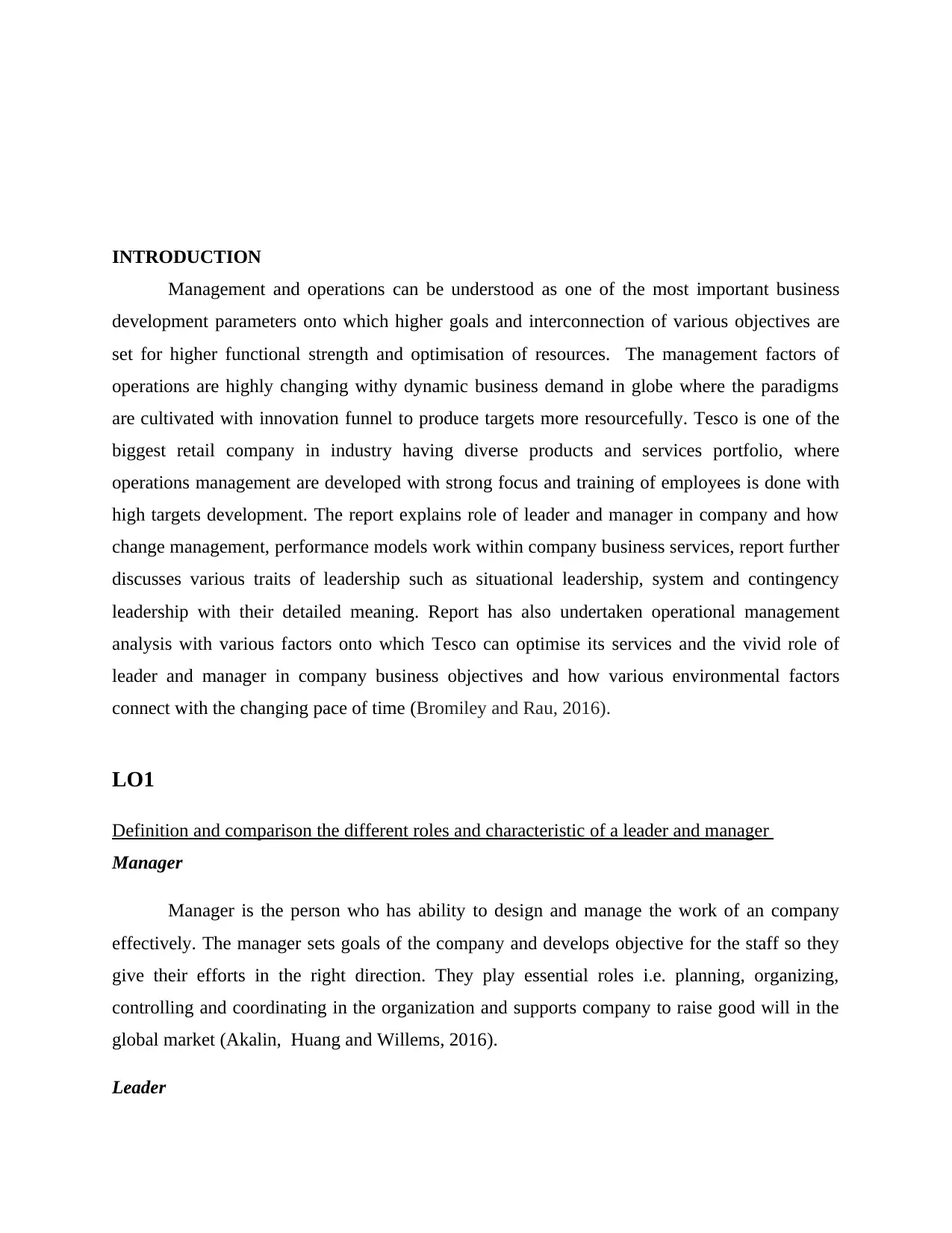
INTRODUCTION
Management and operations can be understood as one of the most important business
development parameters onto which higher goals and interconnection of various objectives are
set for higher functional strength and optimisation of resources. The management factors of
operations are highly changing withy dynamic business demand in globe where the paradigms
are cultivated with innovation funnel to produce targets more resourcefully. Tesco is one of the
biggest retail company in industry having diverse products and services portfolio, where
operations management are developed with strong focus and training of employees is done with
high targets development. The report explains role of leader and manager in company and how
change management, performance models work within company business services, report further
discusses various traits of leadership such as situational leadership, system and contingency
leadership with their detailed meaning. Report has also undertaken operational management
analysis with various factors onto which Tesco can optimise its services and the vivid role of
leader and manager in company business objectives and how various environmental factors
connect with the changing pace of time (Bromiley and Rau, 2016).
LO1
Definition and comparison the different roles and characteristic of a leader and manager
Manager
Manager is the person who has ability to design and manage the work of an company
effectively. The manager sets goals of the company and develops objective for the staff so they
give their efforts in the right direction. They play essential roles i.e. planning, organizing,
controlling and coordinating in the organization and supports company to raise good will in the
global market (Akalin, Huang and Willems, 2016).
Leader
Management and operations can be understood as one of the most important business
development parameters onto which higher goals and interconnection of various objectives are
set for higher functional strength and optimisation of resources. The management factors of
operations are highly changing withy dynamic business demand in globe where the paradigms
are cultivated with innovation funnel to produce targets more resourcefully. Tesco is one of the
biggest retail company in industry having diverse products and services portfolio, where
operations management are developed with strong focus and training of employees is done with
high targets development. The report explains role of leader and manager in company and how
change management, performance models work within company business services, report further
discusses various traits of leadership such as situational leadership, system and contingency
leadership with their detailed meaning. Report has also undertaken operational management
analysis with various factors onto which Tesco can optimise its services and the vivid role of
leader and manager in company business objectives and how various environmental factors
connect with the changing pace of time (Bromiley and Rau, 2016).
LO1
Definition and comparison the different roles and characteristic of a leader and manager
Manager
Manager is the person who has ability to design and manage the work of an company
effectively. The manager sets goals of the company and develops objective for the staff so they
give their efforts in the right direction. They play essential roles i.e. planning, organizing,
controlling and coordinating in the organization and supports company to raise good will in the
global market (Akalin, Huang and Willems, 2016).
Leader
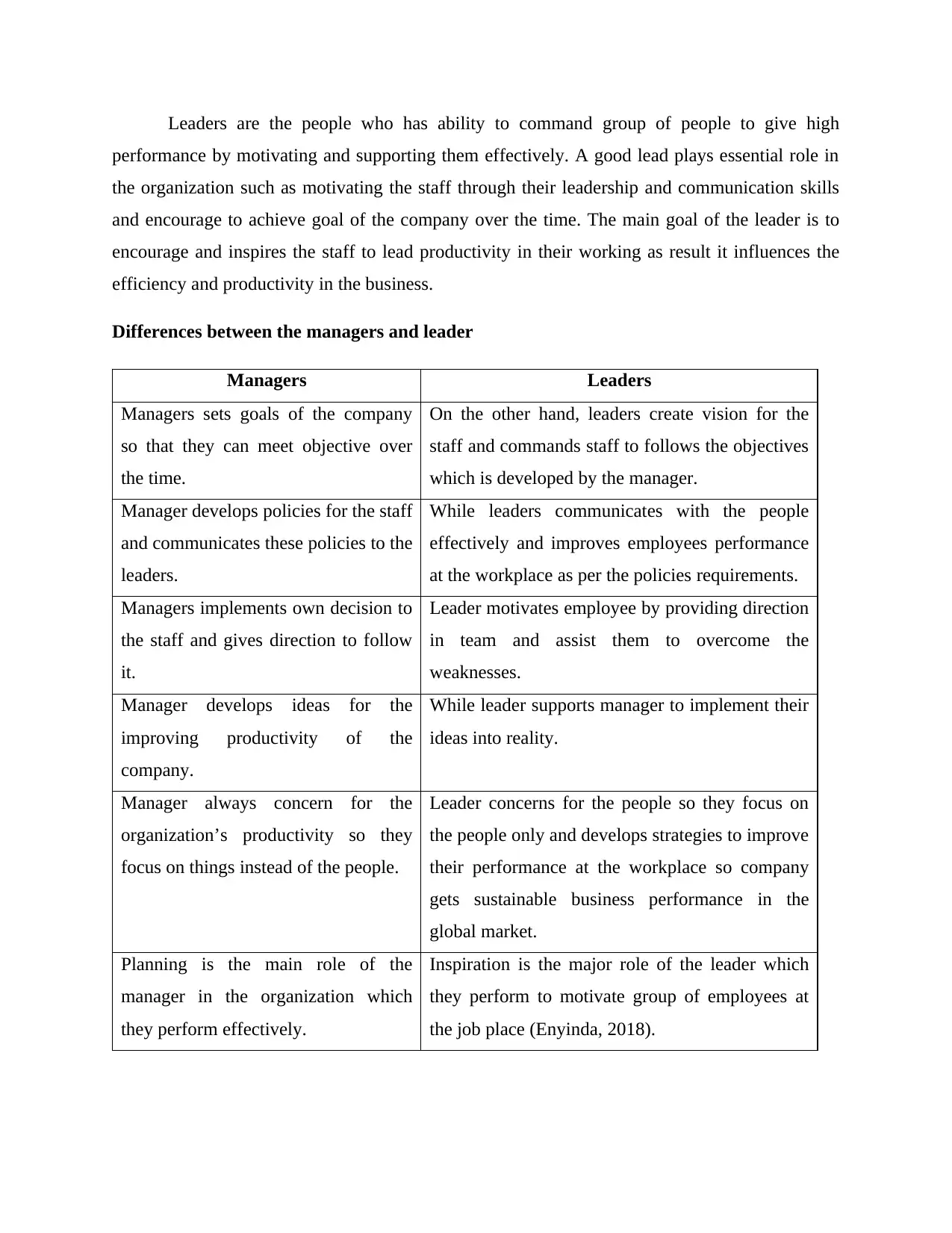
Leaders are the people who has ability to command group of people to give high
performance by motivating and supporting them effectively. A good lead plays essential role in
the organization such as motivating the staff through their leadership and communication skills
and encourage to achieve goal of the company over the time. The main goal of the leader is to
encourage and inspires the staff to lead productivity in their working as result it influences the
efficiency and productivity in the business.
Differences between the managers and leader
Managers Leaders
Managers sets goals of the company
so that they can meet objective over
the time.
On the other hand, leaders create vision for the
staff and commands staff to follows the objectives
which is developed by the manager.
Manager develops policies for the staff
and communicates these policies to the
leaders.
While leaders communicates with the people
effectively and improves employees performance
at the workplace as per the policies requirements.
Managers implements own decision to
the staff and gives direction to follow
it.
Leader motivates employee by providing direction
in team and assist them to overcome the
weaknesses.
Manager develops ideas for the
improving productivity of the
company.
While leader supports manager to implement their
ideas into reality.
Manager always concern for the
organization’s productivity so they
focus on things instead of the people.
Leader concerns for the people so they focus on
the people only and develops strategies to improve
their performance at the workplace so company
gets sustainable business performance in the
global market.
Planning is the main role of the
manager in the organization which
they perform effectively.
Inspiration is the major role of the leader which
they perform to motivate group of employees at
the job place (Enyinda, 2018).
performance by motivating and supporting them effectively. A good lead plays essential role in
the organization such as motivating the staff through their leadership and communication skills
and encourage to achieve goal of the company over the time. The main goal of the leader is to
encourage and inspires the staff to lead productivity in their working as result it influences the
efficiency and productivity in the business.
Differences between the managers and leader
Managers Leaders
Managers sets goals of the company
so that they can meet objective over
the time.
On the other hand, leaders create vision for the
staff and commands staff to follows the objectives
which is developed by the manager.
Manager develops policies for the staff
and communicates these policies to the
leaders.
While leaders communicates with the people
effectively and improves employees performance
at the workplace as per the policies requirements.
Managers implements own decision to
the staff and gives direction to follow
it.
Leader motivates employee by providing direction
in team and assist them to overcome the
weaknesses.
Manager develops ideas for the
improving productivity of the
company.
While leader supports manager to implement their
ideas into reality.
Manager always concern for the
organization’s productivity so they
focus on things instead of the people.
Leader concerns for the people so they focus on
the people only and develops strategies to improve
their performance at the workplace so company
gets sustainable business performance in the
global market.
Planning is the main role of the
manager in the organization which
they perform effectively.
Inspiration is the major role of the leader which
they perform to motivate group of employees at
the job place (Enyinda, 2018).
Secure Best Marks with AI Grader
Need help grading? Try our AI Grader for instant feedback on your assignments.
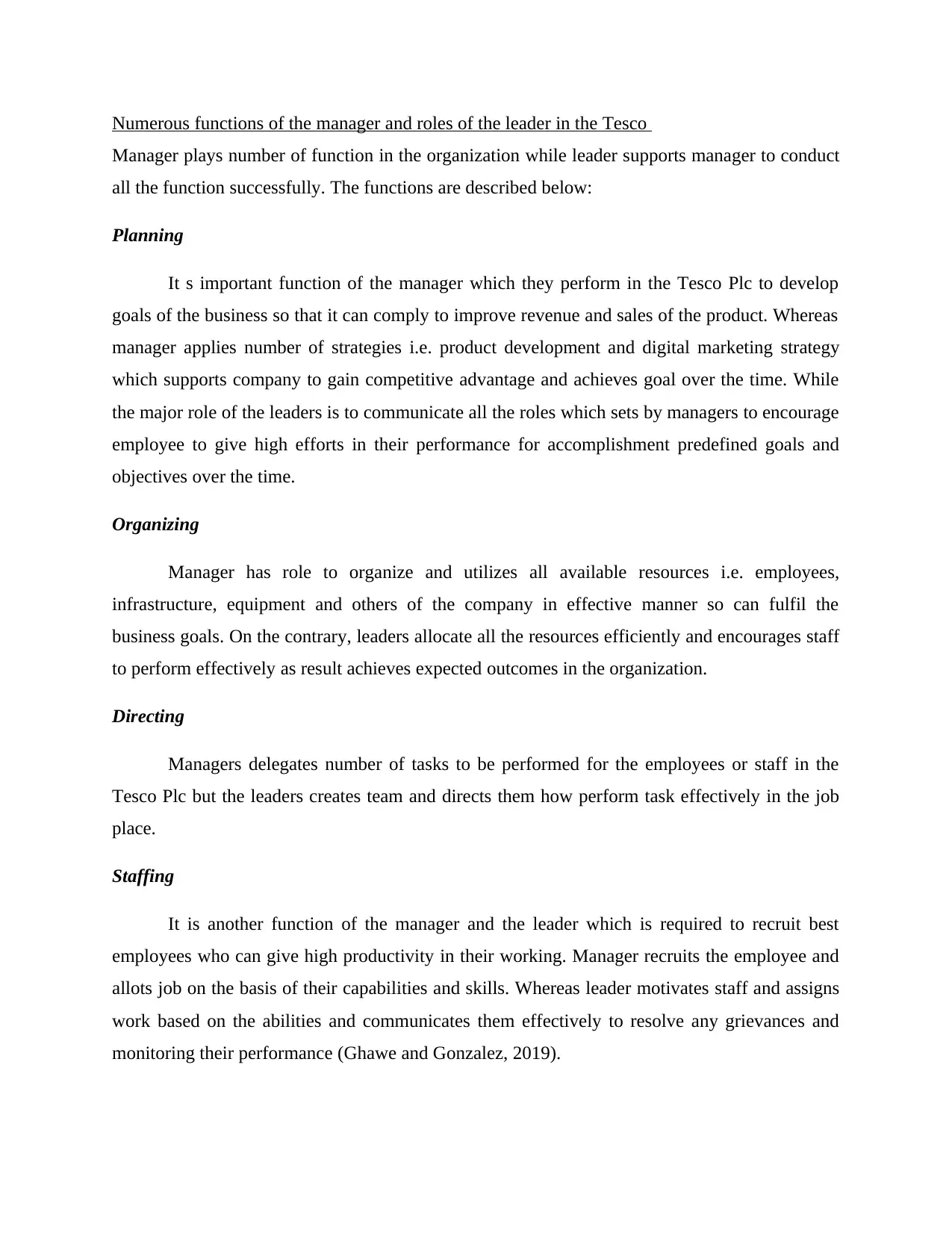
Numerous functions of the manager and roles of the leader in the Tesco
Manager plays number of function in the organization while leader supports manager to conduct
all the function successfully. The functions are described below:
Planning
It s important function of the manager which they perform in the Tesco Plc to develop
goals of the business so that it can comply to improve revenue and sales of the product. Whereas
manager applies number of strategies i.e. product development and digital marketing strategy
which supports company to gain competitive advantage and achieves goal over the time. While
the major role of the leaders is to communicate all the roles which sets by managers to encourage
employee to give high efforts in their performance for accomplishment predefined goals and
objectives over the time.
Organizing
Manager has role to organize and utilizes all available resources i.e. employees,
infrastructure, equipment and others of the company in effective manner so can fulfil the
business goals. On the contrary, leaders allocate all the resources efficiently and encourages staff
to perform effectively as result achieves expected outcomes in the organization.
Directing
Managers delegates number of tasks to be performed for the employees or staff in the
Tesco Plc but the leaders creates team and directs them how perform task effectively in the job
place.
Staffing
It is another function of the manager and the leader which is required to recruit best
employees who can give high productivity in their working. Manager recruits the employee and
allots job on the basis of their capabilities and skills. Whereas leader motivates staff and assigns
work based on the abilities and communicates them effectively to resolve any grievances and
monitoring their performance (Ghawe and Gonzalez, 2019).
Manager plays number of function in the organization while leader supports manager to conduct
all the function successfully. The functions are described below:
Planning
It s important function of the manager which they perform in the Tesco Plc to develop
goals of the business so that it can comply to improve revenue and sales of the product. Whereas
manager applies number of strategies i.e. product development and digital marketing strategy
which supports company to gain competitive advantage and achieves goal over the time. While
the major role of the leaders is to communicate all the roles which sets by managers to encourage
employee to give high efforts in their performance for accomplishment predefined goals and
objectives over the time.
Organizing
Manager has role to organize and utilizes all available resources i.e. employees,
infrastructure, equipment and others of the company in effective manner so can fulfil the
business goals. On the contrary, leaders allocate all the resources efficiently and encourages staff
to perform effectively as result achieves expected outcomes in the organization.
Directing
Managers delegates number of tasks to be performed for the employees or staff in the
Tesco Plc but the leaders creates team and directs them how perform task effectively in the job
place.
Staffing
It is another function of the manager and the leader which is required to recruit best
employees who can give high productivity in their working. Manager recruits the employee and
allots job on the basis of their capabilities and skills. Whereas leader motivates staff and assigns
work based on the abilities and communicates them effectively to resolve any grievances and
monitoring their performance (Ghawe and Gonzalez, 2019).
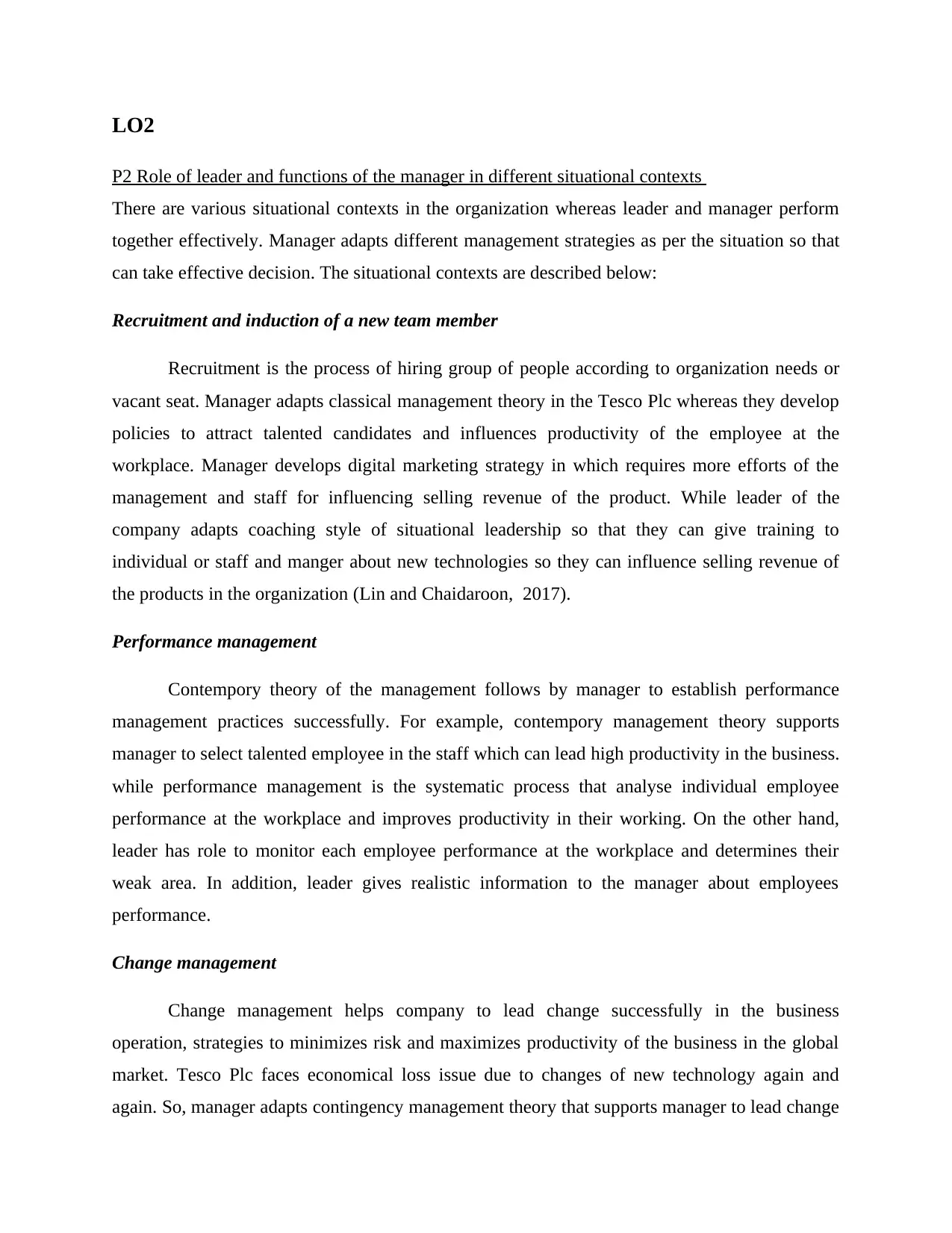
LO2
P2 Role of leader and functions of the manager in different situational contexts
There are various situational contexts in the organization whereas leader and manager perform
together effectively. Manager adapts different management strategies as per the situation so that
can take effective decision. The situational contexts are described below:
Recruitment and induction of a new team member
Recruitment is the process of hiring group of people according to organization needs or
vacant seat. Manager adapts classical management theory in the Tesco Plc whereas they develop
policies to attract talented candidates and influences productivity of the employee at the
workplace. Manager develops digital marketing strategy in which requires more efforts of the
management and staff for influencing selling revenue of the product. While leader of the
company adapts coaching style of situational leadership so that they can give training to
individual or staff and manger about new technologies so they can influence selling revenue of
the products in the organization (Lin and Chaidaroon, 2017).
Performance management
Contempory theory of the management follows by manager to establish performance
management practices successfully. For example, contempory management theory supports
manager to select talented employee in the staff which can lead high productivity in the business.
while performance management is the systematic process that analyse individual employee
performance at the workplace and improves productivity in their working. On the other hand,
leader has role to monitor each employee performance at the workplace and determines their
weak area. In addition, leader gives realistic information to the manager about employees
performance.
Change management
Change management helps company to lead change successfully in the business
operation, strategies to minimizes risk and maximizes productivity of the business in the global
market. Tesco Plc faces economical loss issue due to changes of new technology again and
again. So, manager adapts contingency management theory that supports manager to lead change
P2 Role of leader and functions of the manager in different situational contexts
There are various situational contexts in the organization whereas leader and manager perform
together effectively. Manager adapts different management strategies as per the situation so that
can take effective decision. The situational contexts are described below:
Recruitment and induction of a new team member
Recruitment is the process of hiring group of people according to organization needs or
vacant seat. Manager adapts classical management theory in the Tesco Plc whereas they develop
policies to attract talented candidates and influences productivity of the employee at the
workplace. Manager develops digital marketing strategy in which requires more efforts of the
management and staff for influencing selling revenue of the product. While leader of the
company adapts coaching style of situational leadership so that they can give training to
individual or staff and manger about new technologies so they can influence selling revenue of
the products in the organization (Lin and Chaidaroon, 2017).
Performance management
Contempory theory of the management follows by manager to establish performance
management practices successfully. For example, contempory management theory supports
manager to select talented employee in the staff which can lead high productivity in the business.
while performance management is the systematic process that analyse individual employee
performance at the workplace and improves productivity in their working. On the other hand,
leader has role to monitor each employee performance at the workplace and determines their
weak area. In addition, leader gives realistic information to the manager about employees
performance.
Change management
Change management helps company to lead change successfully in the business
operation, strategies to minimizes risk and maximizes productivity of the business in the global
market. Tesco Plc faces economical loss issue due to changes of new technology again and
again. So, manager adapts contingency management theory that supports manager to lead change
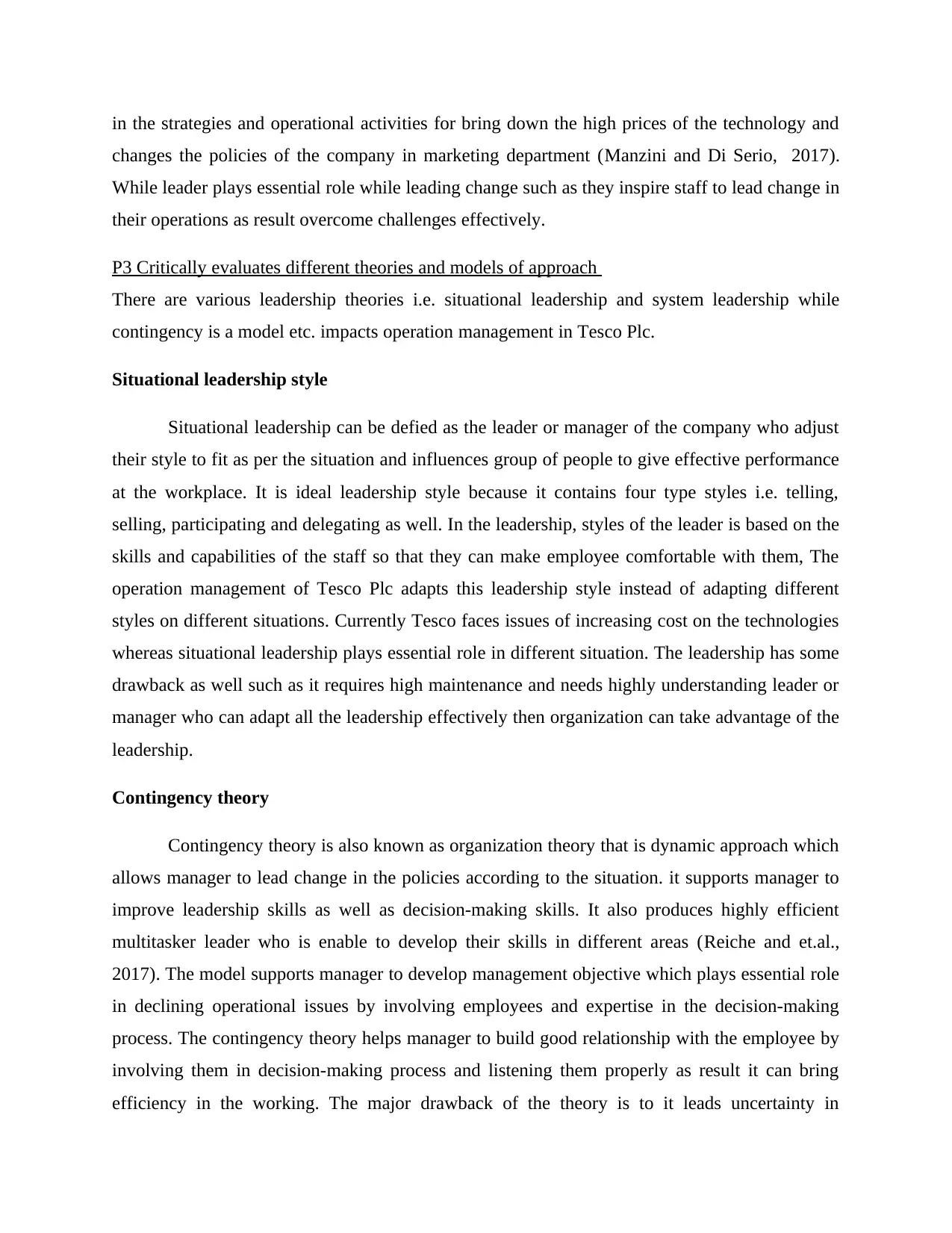
in the strategies and operational activities for bring down the high prices of the technology and
changes the policies of the company in marketing department (Manzini and Di Serio, 2017).
While leader plays essential role while leading change such as they inspire staff to lead change in
their operations as result overcome challenges effectively.
P3 Critically evaluates different theories and models of approach
There are various leadership theories i.e. situational leadership and system leadership while
contingency is a model etc. impacts operation management in Tesco Plc.
Situational leadership style
Situational leadership can be defied as the leader or manager of the company who adjust
their style to fit as per the situation and influences group of people to give effective performance
at the workplace. It is ideal leadership style because it contains four type styles i.e. telling,
selling, participating and delegating as well. In the leadership, styles of the leader is based on the
skills and capabilities of the staff so that they can make employee comfortable with them, The
operation management of Tesco Plc adapts this leadership style instead of adapting different
styles on different situations. Currently Tesco faces issues of increasing cost on the technologies
whereas situational leadership plays essential role in different situation. The leadership has some
drawback as well such as it requires high maintenance and needs highly understanding leader or
manager who can adapt all the leadership effectively then organization can take advantage of the
leadership.
Contingency theory
Contingency theory is also known as organization theory that is dynamic approach which
allows manager to lead change in the policies according to the situation. it supports manager to
improve leadership skills as well as decision-making skills. It also produces highly efficient
multitasker leader who is enable to develop their skills in different areas (Reiche and et.al.,
2017). The model supports manager to develop management objective which plays essential role
in declining operational issues by involving employees and expertise in the decision-making
process. The contingency theory helps manager to build good relationship with the employee by
involving them in decision-making process and listening them properly as result it can bring
efficiency in the working. The major drawback of the theory is to it leads uncertainty in
changes the policies of the company in marketing department (Manzini and Di Serio, 2017).
While leader plays essential role while leading change such as they inspire staff to lead change in
their operations as result overcome challenges effectively.
P3 Critically evaluates different theories and models of approach
There are various leadership theories i.e. situational leadership and system leadership while
contingency is a model etc. impacts operation management in Tesco Plc.
Situational leadership style
Situational leadership can be defied as the leader or manager of the company who adjust
their style to fit as per the situation and influences group of people to give effective performance
at the workplace. It is ideal leadership style because it contains four type styles i.e. telling,
selling, participating and delegating as well. In the leadership, styles of the leader is based on the
skills and capabilities of the staff so that they can make employee comfortable with them, The
operation management of Tesco Plc adapts this leadership style instead of adapting different
styles on different situations. Currently Tesco faces issues of increasing cost on the technologies
whereas situational leadership plays essential role in different situation. The leadership has some
drawback as well such as it requires high maintenance and needs highly understanding leader or
manager who can adapt all the leadership effectively then organization can take advantage of the
leadership.
Contingency theory
Contingency theory is also known as organization theory that is dynamic approach which
allows manager to lead change in the policies according to the situation. it supports manager to
improve leadership skills as well as decision-making skills. It also produces highly efficient
multitasker leader who is enable to develop their skills in different areas (Reiche and et.al.,
2017). The model supports manager to develop management objective which plays essential role
in declining operational issues by involving employees and expertise in the decision-making
process. The contingency theory helps manager to build good relationship with the employee by
involving them in decision-making process and listening them properly as result it can bring
efficiency in the working. The major drawback of the theory is to it leads uncertainty in
Paraphrase This Document
Need a fresh take? Get an instant paraphrase of this document with our AI Paraphraser
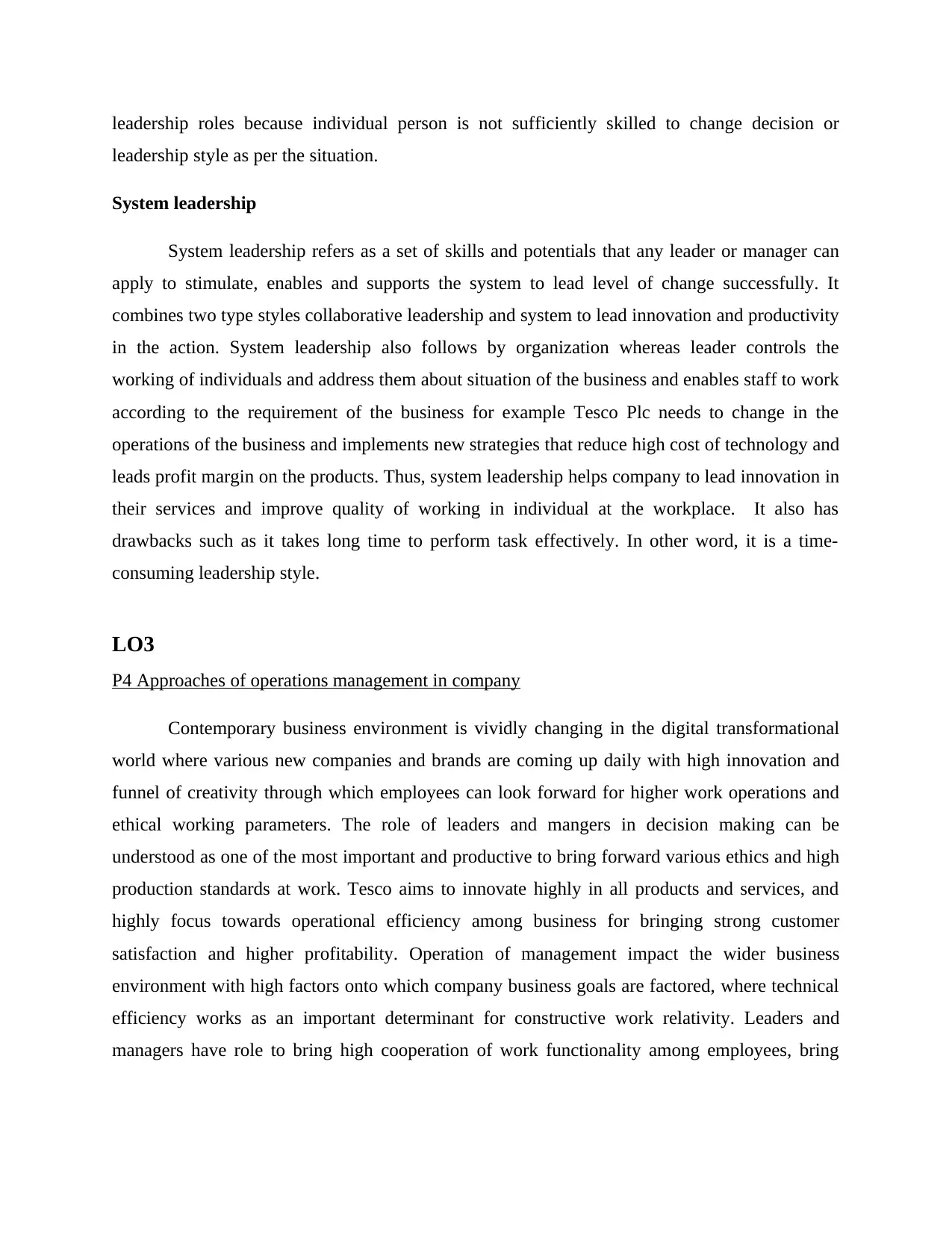
leadership roles because individual person is not sufficiently skilled to change decision or
leadership style as per the situation.
System leadership
System leadership refers as a set of skills and potentials that any leader or manager can
apply to stimulate, enables and supports the system to lead level of change successfully. It
combines two type styles collaborative leadership and system to lead innovation and productivity
in the action. System leadership also follows by organization whereas leader controls the
working of individuals and address them about situation of the business and enables staff to work
according to the requirement of the business for example Tesco Plc needs to change in the
operations of the business and implements new strategies that reduce high cost of technology and
leads profit margin on the products. Thus, system leadership helps company to lead innovation in
their services and improve quality of working in individual at the workplace. It also has
drawbacks such as it takes long time to perform task effectively. In other word, it is a time-
consuming leadership style.
LO3
P4 Approaches of operations management in company
Contemporary business environment is vividly changing in the digital transformational
world where various new companies and brands are coming up daily with high innovation and
funnel of creativity through which employees can look forward for higher work operations and
ethical working parameters. The role of leaders and mangers in decision making can be
understood as one of the most important and productive to bring forward various ethics and high
production standards at work. Tesco aims to innovate highly in all products and services, and
highly focus towards operational efficiency among business for bringing strong customer
satisfaction and higher profitability. Operation of management impact the wider business
environment with high factors onto which company business goals are factored, where technical
efficiency works as an important determinant for constructive work relativity. Leaders and
managers have role to bring high cooperation of work functionality among employees, bring
leadership style as per the situation.
System leadership
System leadership refers as a set of skills and potentials that any leader or manager can
apply to stimulate, enables and supports the system to lead level of change successfully. It
combines two type styles collaborative leadership and system to lead innovation and productivity
in the action. System leadership also follows by organization whereas leader controls the
working of individuals and address them about situation of the business and enables staff to work
according to the requirement of the business for example Tesco Plc needs to change in the
operations of the business and implements new strategies that reduce high cost of technology and
leads profit margin on the products. Thus, system leadership helps company to lead innovation in
their services and improve quality of working in individual at the workplace. It also has
drawbacks such as it takes long time to perform task effectively. In other word, it is a time-
consuming leadership style.
LO3
P4 Approaches of operations management in company
Contemporary business environment is vividly changing in the digital transformational
world where various new companies and brands are coming up daily with high innovation and
funnel of creativity through which employees can look forward for higher work operations and
ethical working parameters. The role of leaders and mangers in decision making can be
understood as one of the most important and productive to bring forward various ethics and high
production standards at work. Tesco aims to innovate highly in all products and services, and
highly focus towards operational efficiency among business for bringing strong customer
satisfaction and higher profitability. Operation of management impact the wider business
environment with high factors onto which company business goals are factored, where technical
efficiency works as an important determinant for constructive work relativity. Leaders and
managers have role to bring high cooperation of work functionality among employees, bring
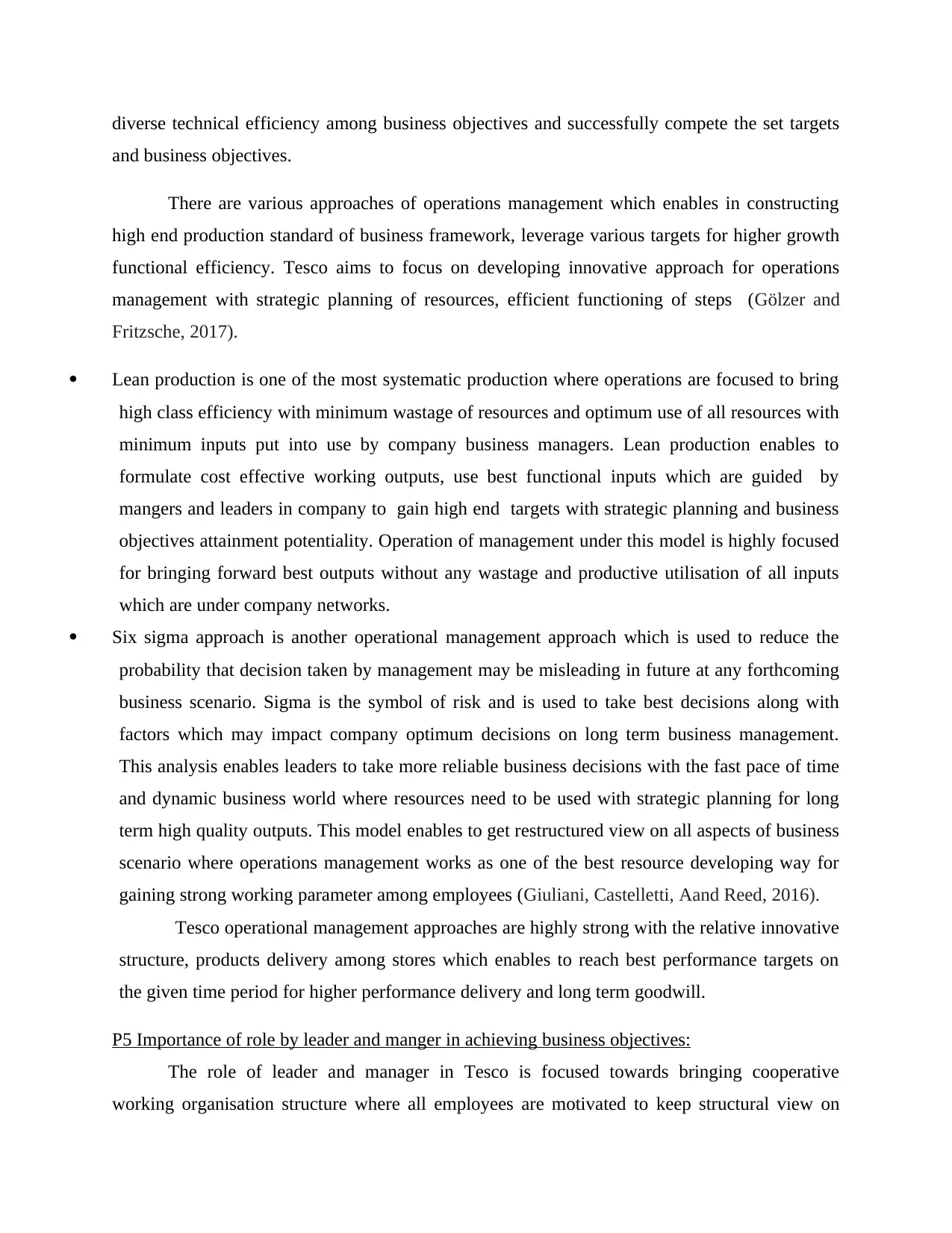
diverse technical efficiency among business objectives and successfully compete the set targets
and business objectives.
There are various approaches of operations management which enables in constructing
high end production standard of business framework, leverage various targets for higher growth
functional efficiency. Tesco aims to focus on developing innovative approach for operations
management with strategic planning of resources, efficient functioning of steps (Gölzer and
Fritzsche, 2017).
Lean production is one of the most systematic production where operations are focused to bring
high class efficiency with minimum wastage of resources and optimum use of all resources with
minimum inputs put into use by company business managers. Lean production enables to
formulate cost effective working outputs, use best functional inputs which are guided by
mangers and leaders in company to gain high end targets with strategic planning and business
objectives attainment potentiality. Operation of management under this model is highly focused
for bringing forward best outputs without any wastage and productive utilisation of all inputs
which are under company networks.
Six sigma approach is another operational management approach which is used to reduce the
probability that decision taken by management may be misleading in future at any forthcoming
business scenario. Sigma is the symbol of risk and is used to take best decisions along with
factors which may impact company optimum decisions on long term business management.
This analysis enables leaders to take more reliable business decisions with the fast pace of time
and dynamic business world where resources need to be used with strategic planning for long
term high quality outputs. This model enables to get restructured view on all aspects of business
scenario where operations management works as one of the best resource developing way for
gaining strong working parameter among employees (Giuliani, Castelletti, Aand Reed, 2016).
Tesco operational management approaches are highly strong with the relative innovative
structure, products delivery among stores which enables to reach best performance targets on
the given time period for higher performance delivery and long term goodwill.
P5 Importance of role by leader and manger in achieving business objectives:
The role of leader and manager in Tesco is focused towards bringing cooperative
working organisation structure where all employees are motivated to keep structural view on
and business objectives.
There are various approaches of operations management which enables in constructing
high end production standard of business framework, leverage various targets for higher growth
functional efficiency. Tesco aims to focus on developing innovative approach for operations
management with strategic planning of resources, efficient functioning of steps (Gölzer and
Fritzsche, 2017).
Lean production is one of the most systematic production where operations are focused to bring
high class efficiency with minimum wastage of resources and optimum use of all resources with
minimum inputs put into use by company business managers. Lean production enables to
formulate cost effective working outputs, use best functional inputs which are guided by
mangers and leaders in company to gain high end targets with strategic planning and business
objectives attainment potentiality. Operation of management under this model is highly focused
for bringing forward best outputs without any wastage and productive utilisation of all inputs
which are under company networks.
Six sigma approach is another operational management approach which is used to reduce the
probability that decision taken by management may be misleading in future at any forthcoming
business scenario. Sigma is the symbol of risk and is used to take best decisions along with
factors which may impact company optimum decisions on long term business management.
This analysis enables leaders to take more reliable business decisions with the fast pace of time
and dynamic business world where resources need to be used with strategic planning for long
term high quality outputs. This model enables to get restructured view on all aspects of business
scenario where operations management works as one of the best resource developing way for
gaining strong working parameter among employees (Giuliani, Castelletti, Aand Reed, 2016).
Tesco operational management approaches are highly strong with the relative innovative
structure, products delivery among stores which enables to reach best performance targets on
the given time period for higher performance delivery and long term goodwill.
P5 Importance of role by leader and manger in achieving business objectives:
The role of leader and manager in Tesco is focused towards bringing cooperative
working organisation structure where all employees are motivated to keep structural view on
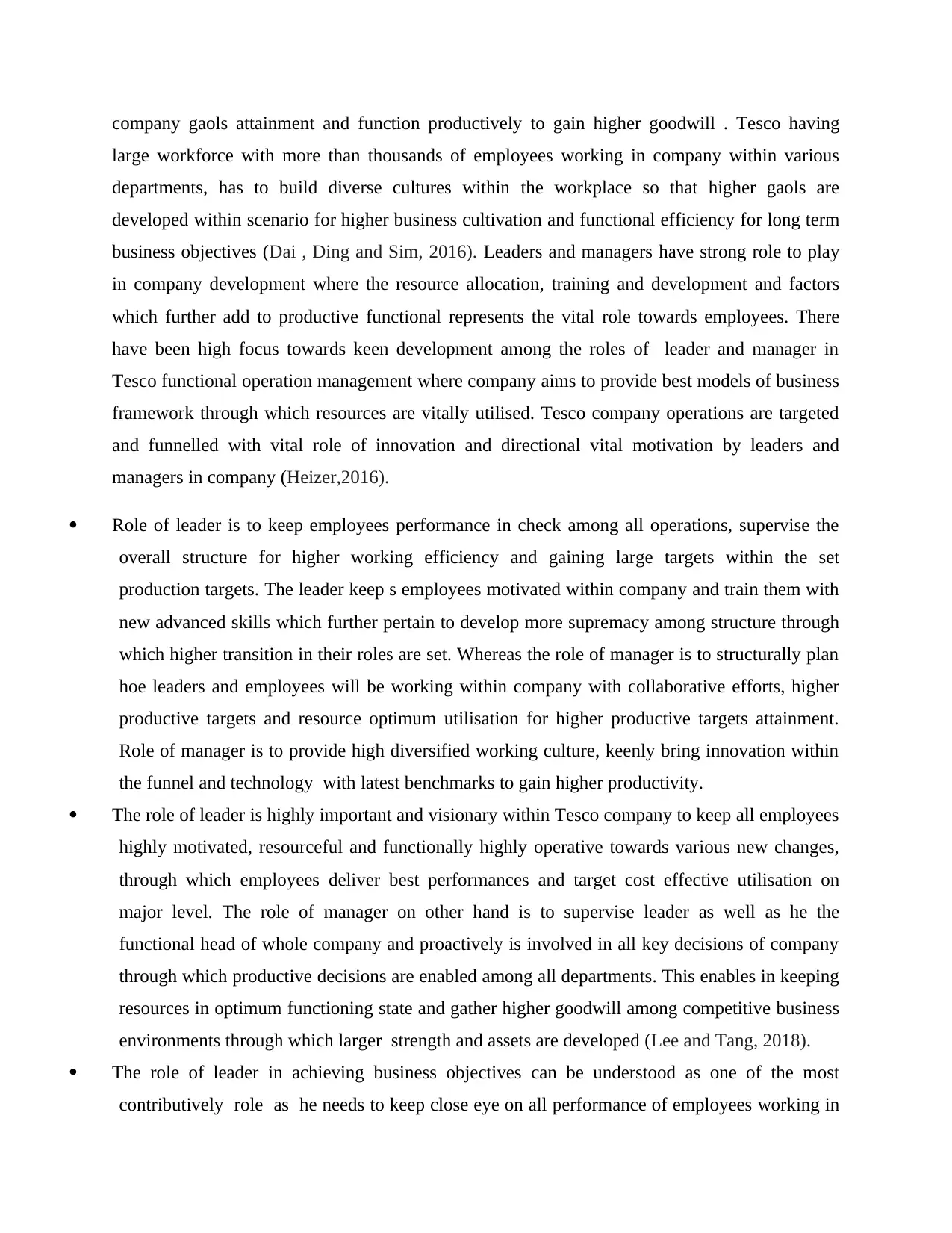
company gaols attainment and function productively to gain higher goodwill . Tesco having
large workforce with more than thousands of employees working in company within various
departments, has to build diverse cultures within the workplace so that higher gaols are
developed within scenario for higher business cultivation and functional efficiency for long term
business objectives (Dai , Ding and Sim, 2016). Leaders and managers have strong role to play
in company development where the resource allocation, training and development and factors
which further add to productive functional represents the vital role towards employees. There
have been high focus towards keen development among the roles of leader and manager in
Tesco functional operation management where company aims to provide best models of business
framework through which resources are vitally utilised. Tesco company operations are targeted
and funnelled with vital role of innovation and directional vital motivation by leaders and
managers in company (Heizer,2016).
Role of leader is to keep employees performance in check among all operations, supervise the
overall structure for higher working efficiency and gaining large targets within the set
production targets. The leader keep s employees motivated within company and train them with
new advanced skills which further pertain to develop more supremacy among structure through
which higher transition in their roles are set. Whereas the role of manager is to structurally plan
hoe leaders and employees will be working within company with collaborative efforts, higher
productive targets and resource optimum utilisation for higher productive targets attainment.
Role of manager is to provide high diversified working culture, keenly bring innovation within
the funnel and technology with latest benchmarks to gain higher productivity.
The role of leader is highly important and visionary within Tesco company to keep all employees
highly motivated, resourceful and functionally highly operative towards various new changes,
through which employees deliver best performances and target cost effective utilisation on
major level. The role of manager on other hand is to supervise leader as well as he the
functional head of whole company and proactively is involved in all key decisions of company
through which productive decisions are enabled among all departments. This enables in keeping
resources in optimum functioning state and gather higher goodwill among competitive business
environments through which larger strength and assets are developed (Lee and Tang, 2018).
The role of leader in achieving business objectives can be understood as one of the most
contributively role as he needs to keep close eye on all performance of employees working in
large workforce with more than thousands of employees working in company within various
departments, has to build diverse cultures within the workplace so that higher gaols are
developed within scenario for higher business cultivation and functional efficiency for long term
business objectives (Dai , Ding and Sim, 2016). Leaders and managers have strong role to play
in company development where the resource allocation, training and development and factors
which further add to productive functional represents the vital role towards employees. There
have been high focus towards keen development among the roles of leader and manager in
Tesco functional operation management where company aims to provide best models of business
framework through which resources are vitally utilised. Tesco company operations are targeted
and funnelled with vital role of innovation and directional vital motivation by leaders and
managers in company (Heizer,2016).
Role of leader is to keep employees performance in check among all operations, supervise the
overall structure for higher working efficiency and gaining large targets within the set
production targets. The leader keep s employees motivated within company and train them with
new advanced skills which further pertain to develop more supremacy among structure through
which higher transition in their roles are set. Whereas the role of manager is to structurally plan
hoe leaders and employees will be working within company with collaborative efforts, higher
productive targets and resource optimum utilisation for higher productive targets attainment.
Role of manager is to provide high diversified working culture, keenly bring innovation within
the funnel and technology with latest benchmarks to gain higher productivity.
The role of leader is highly important and visionary within Tesco company to keep all employees
highly motivated, resourceful and functionally highly operative towards various new changes,
through which employees deliver best performances and target cost effective utilisation on
major level. The role of manager on other hand is to supervise leader as well as he the
functional head of whole company and proactively is involved in all key decisions of company
through which productive decisions are enabled among all departments. This enables in keeping
resources in optimum functioning state and gather higher goodwill among competitive business
environments through which larger strength and assets are developed (Lee and Tang, 2018).
The role of leader in achieving business objectives can be understood as one of the most
contributively role as he needs to keep close eye on all performance of employees working in
Secure Best Marks with AI Grader
Need help grading? Try our AI Grader for instant feedback on your assignments.
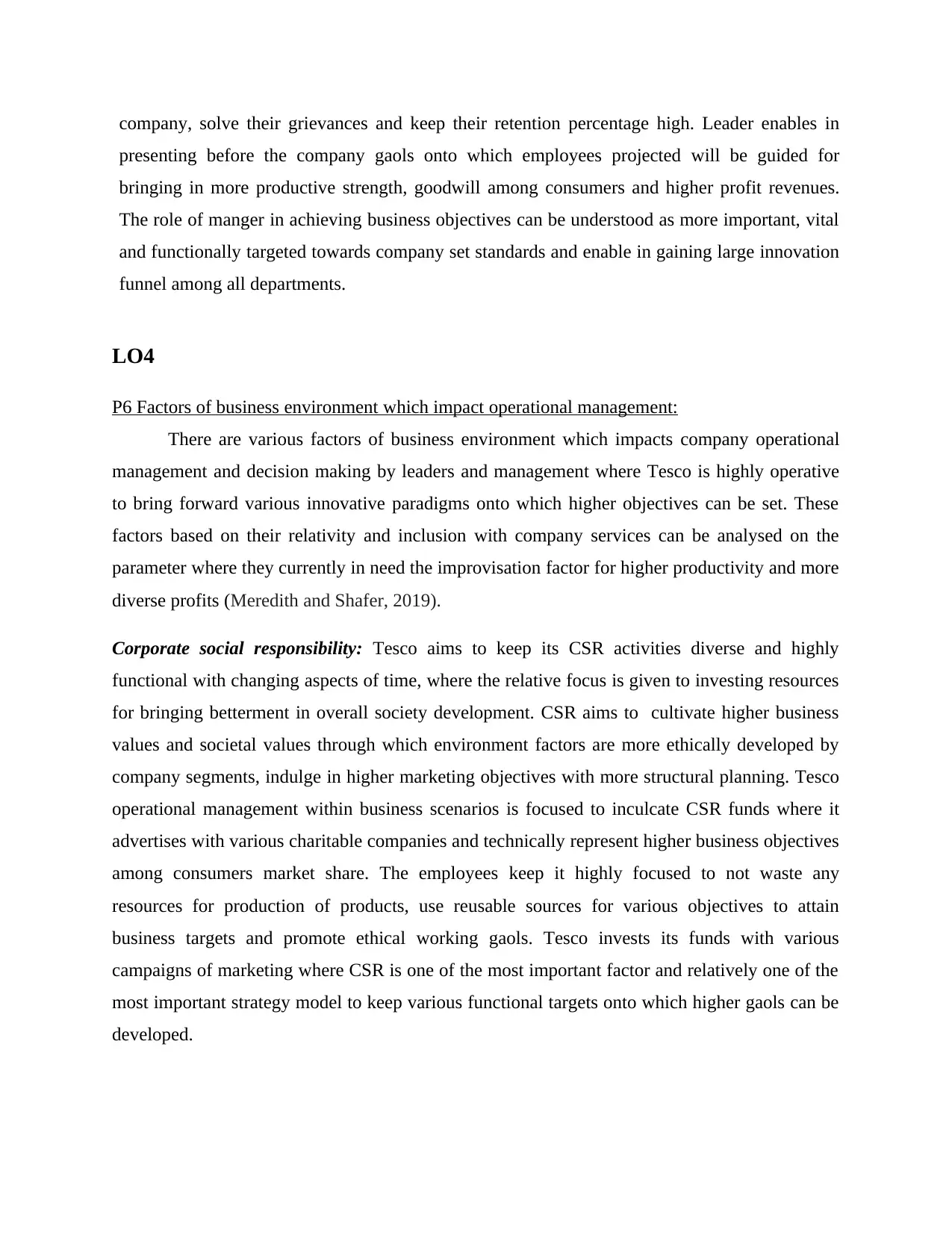
company, solve their grievances and keep their retention percentage high. Leader enables in
presenting before the company gaols onto which employees projected will be guided for
bringing in more productive strength, goodwill among consumers and higher profit revenues.
The role of manger in achieving business objectives can be understood as more important, vital
and functionally targeted towards company set standards and enable in gaining large innovation
funnel among all departments.
LO4
P6 Factors of business environment which impact operational management:
There are various factors of business environment which impacts company operational
management and decision making by leaders and management where Tesco is highly operative
to bring forward various innovative paradigms onto which higher objectives can be set. These
factors based on their relativity and inclusion with company services can be analysed on the
parameter where they currently in need the improvisation factor for higher productivity and more
diverse profits (Meredith and Shafer, 2019).
Corporate social responsibility: Tesco aims to keep its CSR activities diverse and highly
functional with changing aspects of time, where the relative focus is given to investing resources
for bringing betterment in overall society development. CSR aims to cultivate higher business
values and societal values through which environment factors are more ethically developed by
company segments, indulge in higher marketing objectives with more structural planning. Tesco
operational management within business scenarios is focused to inculcate CSR funds where it
advertises with various charitable companies and technically represent higher business objectives
among consumers market share. The employees keep it highly focused to not waste any
resources for production of products, use reusable sources for various objectives to attain
business targets and promote ethical working gaols. Tesco invests its funds with various
campaigns of marketing where CSR is one of the most important factor and relatively one of the
most important strategy model to keep various functional targets onto which higher gaols can be
developed.
presenting before the company gaols onto which employees projected will be guided for
bringing in more productive strength, goodwill among consumers and higher profit revenues.
The role of manger in achieving business objectives can be understood as more important, vital
and functionally targeted towards company set standards and enable in gaining large innovation
funnel among all departments.
LO4
P6 Factors of business environment which impact operational management:
There are various factors of business environment which impacts company operational
management and decision making by leaders and management where Tesco is highly operative
to bring forward various innovative paradigms onto which higher objectives can be set. These
factors based on their relativity and inclusion with company services can be analysed on the
parameter where they currently in need the improvisation factor for higher productivity and more
diverse profits (Meredith and Shafer, 2019).
Corporate social responsibility: Tesco aims to keep its CSR activities diverse and highly
functional with changing aspects of time, where the relative focus is given to investing resources
for bringing betterment in overall society development. CSR aims to cultivate higher business
values and societal values through which environment factors are more ethically developed by
company segments, indulge in higher marketing objectives with more structural planning. Tesco
operational management within business scenarios is focused to inculcate CSR funds where it
advertises with various charitable companies and technically represent higher business objectives
among consumers market share. The employees keep it highly focused to not waste any
resources for production of products, use reusable sources for various objectives to attain
business targets and promote ethical working gaols. Tesco invests its funds with various
campaigns of marketing where CSR is one of the most important factor and relatively one of the
most important strategy model to keep various functional targets onto which higher gaols can be
developed.
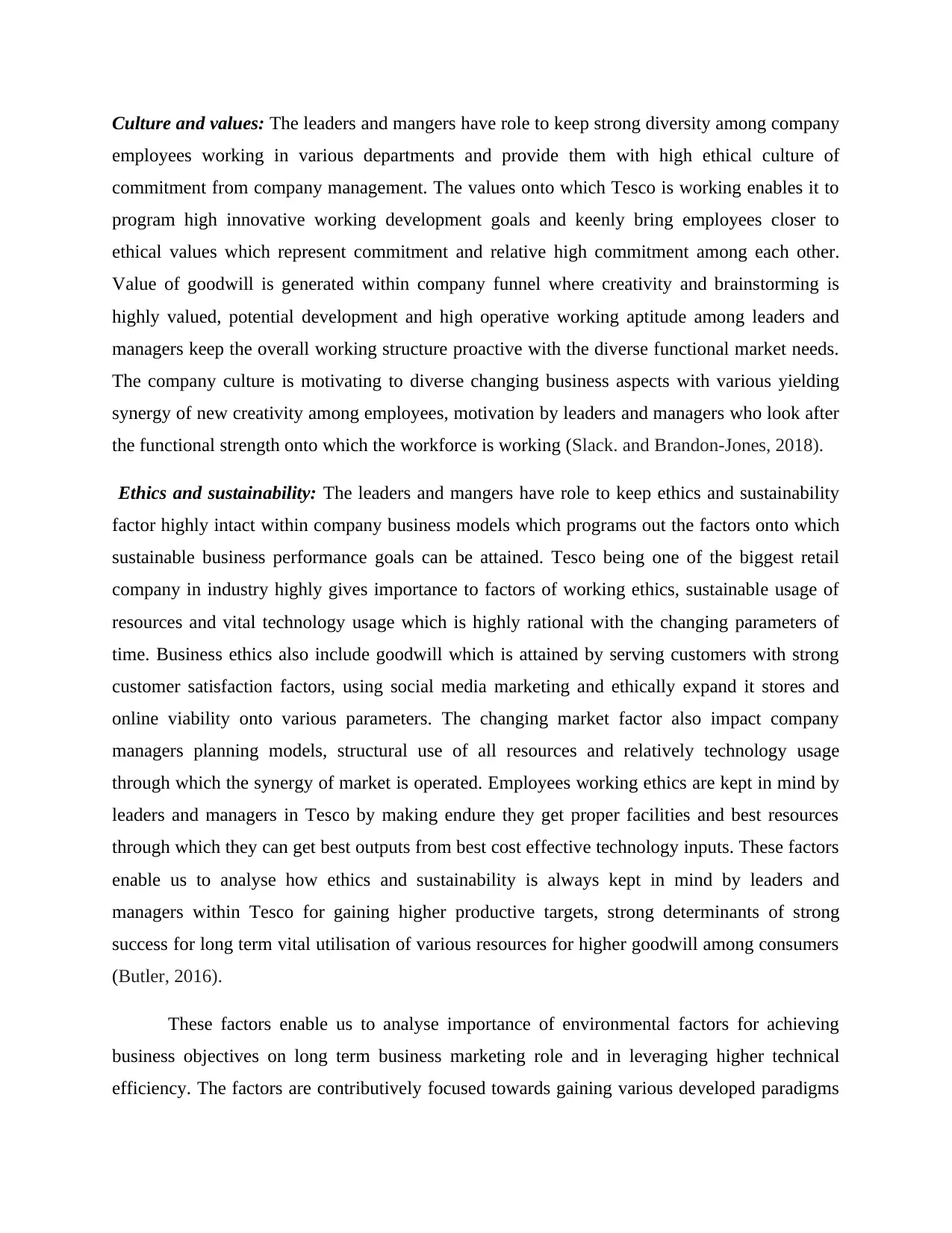
Culture and values: The leaders and mangers have role to keep strong diversity among company
employees working in various departments and provide them with high ethical culture of
commitment from company management. The values onto which Tesco is working enables it to
program high innovative working development goals and keenly bring employees closer to
ethical values which represent commitment and relative high commitment among each other.
Value of goodwill is generated within company funnel where creativity and brainstorming is
highly valued, potential development and high operative working aptitude among leaders and
managers keep the overall working structure proactive with the diverse functional market needs.
The company culture is motivating to diverse changing business aspects with various yielding
synergy of new creativity among employees, motivation by leaders and managers who look after
the functional strength onto which the workforce is working (Slack. and Brandon-Jones, 2018).
Ethics and sustainability: The leaders and mangers have role to keep ethics and sustainability
factor highly intact within company business models which programs out the factors onto which
sustainable business performance goals can be attained. Tesco being one of the biggest retail
company in industry highly gives importance to factors of working ethics, sustainable usage of
resources and vital technology usage which is highly rational with the changing parameters of
time. Business ethics also include goodwill which is attained by serving customers with strong
customer satisfaction factors, using social media marketing and ethically expand it stores and
online viability onto various parameters. The changing market factor also impact company
managers planning models, structural use of all resources and relatively technology usage
through which the synergy of market is operated. Employees working ethics are kept in mind by
leaders and managers in Tesco by making endure they get proper facilities and best resources
through which they can get best outputs from best cost effective technology inputs. These factors
enable us to analyse how ethics and sustainability is always kept in mind by leaders and
managers within Tesco for gaining higher productive targets, strong determinants of strong
success for long term vital utilisation of various resources for higher goodwill among consumers
(Butler, 2016).
These factors enable us to analyse importance of environmental factors for achieving
business objectives on long term business marketing role and in leveraging higher technical
efficiency. The factors are contributively focused towards gaining various developed paradigms
employees working in various departments and provide them with high ethical culture of
commitment from company management. The values onto which Tesco is working enables it to
program high innovative working development goals and keenly bring employees closer to
ethical values which represent commitment and relative high commitment among each other.
Value of goodwill is generated within company funnel where creativity and brainstorming is
highly valued, potential development and high operative working aptitude among leaders and
managers keep the overall working structure proactive with the diverse functional market needs.
The company culture is motivating to diverse changing business aspects with various yielding
synergy of new creativity among employees, motivation by leaders and managers who look after
the functional strength onto which the workforce is working (Slack. and Brandon-Jones, 2018).
Ethics and sustainability: The leaders and mangers have role to keep ethics and sustainability
factor highly intact within company business models which programs out the factors onto which
sustainable business performance goals can be attained. Tesco being one of the biggest retail
company in industry highly gives importance to factors of working ethics, sustainable usage of
resources and vital technology usage which is highly rational with the changing parameters of
time. Business ethics also include goodwill which is attained by serving customers with strong
customer satisfaction factors, using social media marketing and ethically expand it stores and
online viability onto various parameters. The changing market factor also impact company
managers planning models, structural use of all resources and relatively technology usage
through which the synergy of market is operated. Employees working ethics are kept in mind by
leaders and managers in Tesco by making endure they get proper facilities and best resources
through which they can get best outputs from best cost effective technology inputs. These factors
enable us to analyse how ethics and sustainability is always kept in mind by leaders and
managers within Tesco for gaining higher productive targets, strong determinants of strong
success for long term vital utilisation of various resources for higher goodwill among consumers
(Butler, 2016).
These factors enable us to analyse importance of environmental factors for achieving
business objectives on long term business marketing role and in leveraging higher technical
efficiency. The factors are contributively focused towards gaining various developed paradigms
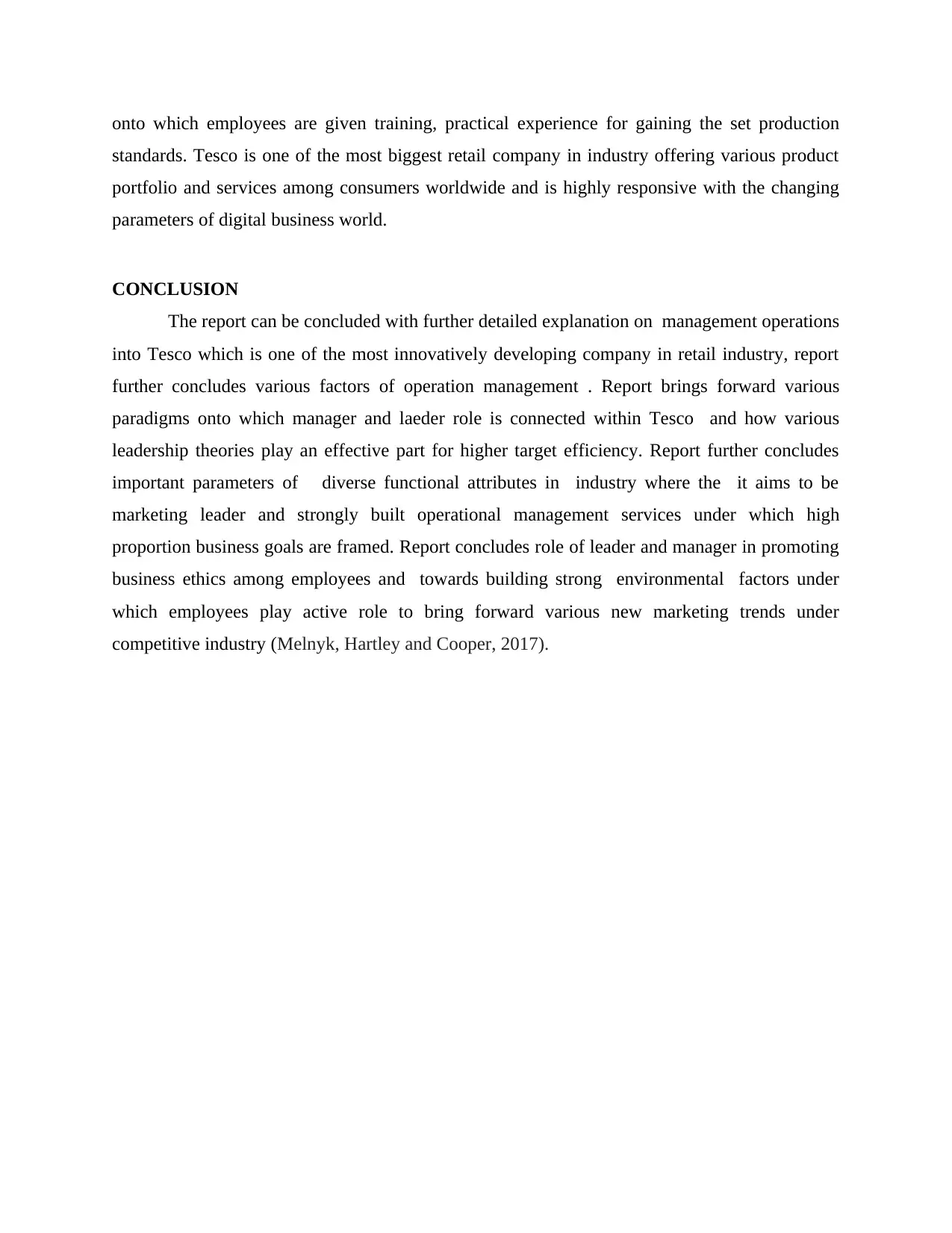
onto which employees are given training, practical experience for gaining the set production
standards. Tesco is one of the most biggest retail company in industry offering various product
portfolio and services among consumers worldwide and is highly responsive with the changing
parameters of digital business world.
CONCLUSION
The report can be concluded with further detailed explanation on management operations
into Tesco which is one of the most innovatively developing company in retail industry, report
further concludes various factors of operation management . Report brings forward various
paradigms onto which manager and laeder role is connected within Tesco and how various
leadership theories play an effective part for higher target efficiency. Report further concludes
important parameters of diverse functional attributes in industry where the it aims to be
marketing leader and strongly built operational management services under which high
proportion business goals are framed. Report concludes role of leader and manager in promoting
business ethics among employees and towards building strong environmental factors under
which employees play active role to bring forward various new marketing trends under
competitive industry (Melnyk, Hartley and Cooper, 2017).
standards. Tesco is one of the most biggest retail company in industry offering various product
portfolio and services among consumers worldwide and is highly responsive with the changing
parameters of digital business world.
CONCLUSION
The report can be concluded with further detailed explanation on management operations
into Tesco which is one of the most innovatively developing company in retail industry, report
further concludes various factors of operation management . Report brings forward various
paradigms onto which manager and laeder role is connected within Tesco and how various
leadership theories play an effective part for higher target efficiency. Report further concludes
important parameters of diverse functional attributes in industry where the it aims to be
marketing leader and strongly built operational management services under which high
proportion business goals are framed. Report concludes role of leader and manager in promoting
business ethics among employees and towards building strong environmental factors under
which employees play active role to bring forward various new marketing trends under
competitive industry (Melnyk, Hartley and Cooper, 2017).
Paraphrase This Document
Need a fresh take? Get an instant paraphrase of this document with our AI Paraphraser
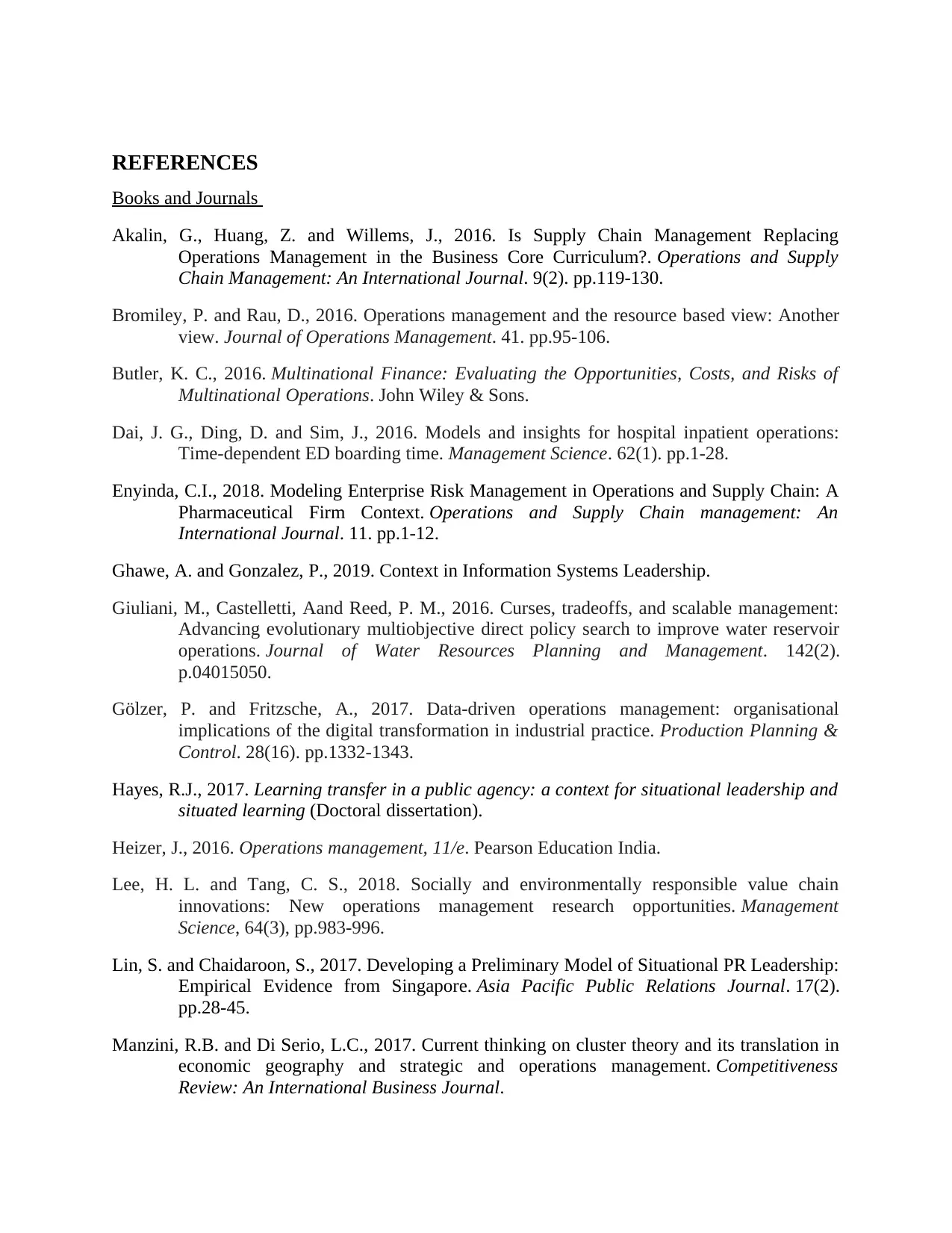
REFERENCES
Books and Journals
Akalin, G., Huang, Z. and Willems, J., 2016. Is Supply Chain Management Replacing
Operations Management in the Business Core Curriculum?. Operations and Supply
Chain Management: An International Journal. 9(2). pp.119-130.
Bromiley, P. and Rau, D., 2016. Operations management and the resource based view: Another
view. Journal of Operations Management. 41. pp.95-106.
Butler, K. C., 2016. Multinational Finance: Evaluating the Opportunities, Costs, and Risks of
Multinational Operations. John Wiley & Sons.
Dai, J. G., Ding, D. and Sim, J., 2016. Models and insights for hospital inpatient operations:
Time-dependent ED boarding time. Management Science. 62(1). pp.1-28.
Enyinda, C.I., 2018. Modeling Enterprise Risk Management in Operations and Supply Chain: A
Pharmaceutical Firm Context. Operations and Supply Chain management: An
International Journal. 11. pp.1-12.
Ghawe, A. and Gonzalez, P., 2019. Context in Information Systems Leadership.
Giuliani, M., Castelletti, Aand Reed, P. M., 2016. Curses, tradeoffs, and scalable management:
Advancing evolutionary multiobjective direct policy search to improve water reservoir
operations. Journal of Water Resources Planning and Management. 142(2).
p.04015050.
Gölzer, P. and Fritzsche, A., 2017. Data-driven operations management: organisational
implications of the digital transformation in industrial practice. Production Planning &
Control. 28(16). pp.1332-1343.
Hayes, R.J., 2017. Learning transfer in a public agency: a context for situational leadership and
situated learning (Doctoral dissertation).
Heizer, J., 2016. Operations management, 11/e. Pearson Education India.
Lee, H. L. and Tang, C. S., 2018. Socially and environmentally responsible value chain
innovations: New operations management research opportunities. Management
Science, 64(3), pp.983-996.
Lin, S. and Chaidaroon, S., 2017. Developing a Preliminary Model of Situational PR Leadership:
Empirical Evidence from Singapore. Asia Pacific Public Relations Journal. 17(2).
pp.28-45.
Manzini, R.B. and Di Serio, L.C., 2017. Current thinking on cluster theory and its translation in
economic geography and strategic and operations management. Competitiveness
Review: An International Business Journal.
Books and Journals
Akalin, G., Huang, Z. and Willems, J., 2016. Is Supply Chain Management Replacing
Operations Management in the Business Core Curriculum?. Operations and Supply
Chain Management: An International Journal. 9(2). pp.119-130.
Bromiley, P. and Rau, D., 2016. Operations management and the resource based view: Another
view. Journal of Operations Management. 41. pp.95-106.
Butler, K. C., 2016. Multinational Finance: Evaluating the Opportunities, Costs, and Risks of
Multinational Operations. John Wiley & Sons.
Dai, J. G., Ding, D. and Sim, J., 2016. Models and insights for hospital inpatient operations:
Time-dependent ED boarding time. Management Science. 62(1). pp.1-28.
Enyinda, C.I., 2018. Modeling Enterprise Risk Management in Operations and Supply Chain: A
Pharmaceutical Firm Context. Operations and Supply Chain management: An
International Journal. 11. pp.1-12.
Ghawe, A. and Gonzalez, P., 2019. Context in Information Systems Leadership.
Giuliani, M., Castelletti, Aand Reed, P. M., 2016. Curses, tradeoffs, and scalable management:
Advancing evolutionary multiobjective direct policy search to improve water reservoir
operations. Journal of Water Resources Planning and Management. 142(2).
p.04015050.
Gölzer, P. and Fritzsche, A., 2017. Data-driven operations management: organisational
implications of the digital transformation in industrial practice. Production Planning &
Control. 28(16). pp.1332-1343.
Hayes, R.J., 2017. Learning transfer in a public agency: a context for situational leadership and
situated learning (Doctoral dissertation).
Heizer, J., 2016. Operations management, 11/e. Pearson Education India.
Lee, H. L. and Tang, C. S., 2018. Socially and environmentally responsible value chain
innovations: New operations management research opportunities. Management
Science, 64(3), pp.983-996.
Lin, S. and Chaidaroon, S., 2017. Developing a Preliminary Model of Situational PR Leadership:
Empirical Evidence from Singapore. Asia Pacific Public Relations Journal. 17(2).
pp.28-45.
Manzini, R.B. and Di Serio, L.C., 2017. Current thinking on cluster theory and its translation in
economic geography and strategic and operations management. Competitiveness
Review: An International Business Journal.
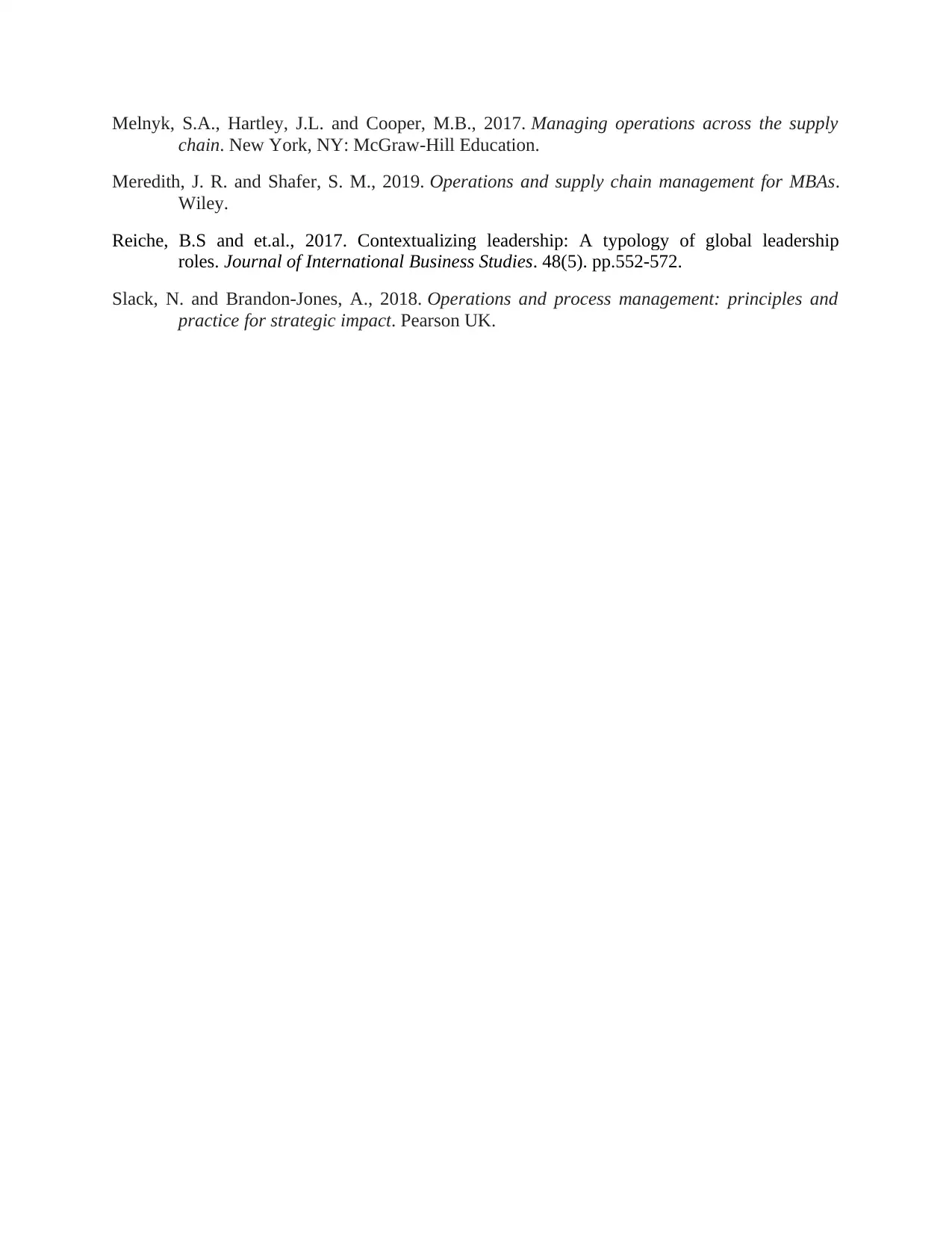
Melnyk, S.A., Hartley, J.L. and Cooper, M.B., 2017. Managing operations across the supply
chain. New York, NY: McGraw-Hill Education.
Meredith, J. R. and Shafer, S. M., 2019. Operations and supply chain management for MBAs.
Wiley.
Reiche, B.S and et.al., 2017. Contextualizing leadership: A typology of global leadership
roles. Journal of International Business Studies. 48(5). pp.552-572.
Slack, N. and Brandon-Jones, A., 2018. Operations and process management: principles and
practice for strategic impact. Pearson UK.
chain. New York, NY: McGraw-Hill Education.
Meredith, J. R. and Shafer, S. M., 2019. Operations and supply chain management for MBAs.
Wiley.
Reiche, B.S and et.al., 2017. Contextualizing leadership: A typology of global leadership
roles. Journal of International Business Studies. 48(5). pp.552-572.
Slack, N. and Brandon-Jones, A., 2018. Operations and process management: principles and
practice for strategic impact. Pearson UK.
1 out of 15
Related Documents
Your All-in-One AI-Powered Toolkit for Academic Success.
+13062052269
info@desklib.com
Available 24*7 on WhatsApp / Email
![[object Object]](/_next/static/media/star-bottom.7253800d.svg)
Unlock your academic potential
© 2024 | Zucol Services PVT LTD | All rights reserved.





